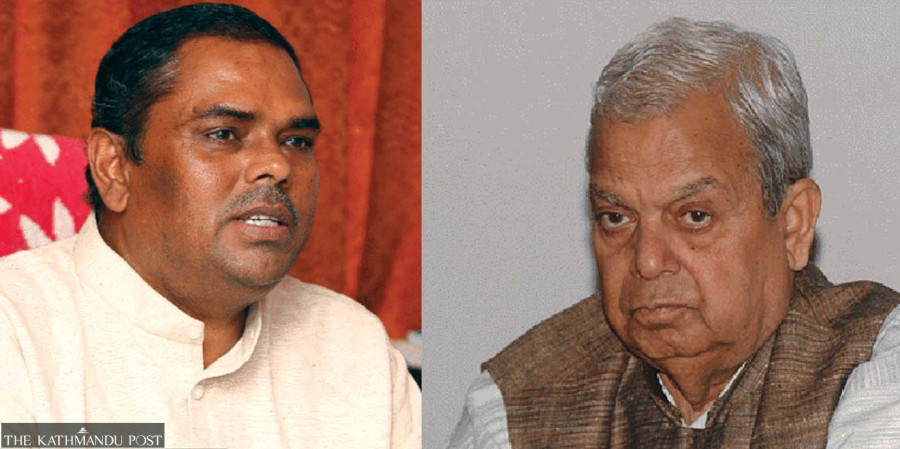Politics
Beset by disputes and splits, Madhesh parties are fighting for relevance in their own base
Janata Samajbadi and Loktantrik Samajbadi are in negotiations with bigger parties eying better prospects in November polls.
Nishan Khatiwada
As seat-sharing negotiations are underway in the ruling coalition, two major Madhes-based parties are also working out strategies to improve their poll prospects.
While the Janata Samajbadi Party, which is part of the coalition, is mulling over quitting the ruling alliance and joining hands with other parties, including the CPN-UML, the Loktantrik Samajbadi Party is wondering if it should join the ruling alliance.
Even the Nepali Congress, the leader of the ruling coalition, appears willing to bring the Loktantrik Samajbadi on board.
Complexities, however, remain. The two Madhesh-based parties are likely to face a tough time during the polls, even if their leaders maintain they are in a comfortable position.
Keshav Jha, a Loktantrik Samajbadi leader, says since they fought local elections on their own, they don’t have any plans to partner with other parties.
He didn’t deny his party is lobbying to join the ruling coalition though.
At a time when the five parties in the coalition have been struggling to finalise seat-sharing, the entry of the Loktantrik Samajbadi may create more confusion, observers say.
For other parties, an alliance with the Janata Samajbadi and Loktantrik Samajbadi is a good bet, as they hold sway over the Madhesh Province, which sends 32 lawmakers to the House of Representatives.
The Madhesh Provincial Assembly is 107-member strong.
In the 2022 local elections, the Nepali Congress emerged as the largest party in the province. The UML too has managed to make inroads in the region.
Out of the 136 local units, Nepali Congress won 46, UML 30, Janata Samajbadi 25 , Loktantrik Samajbadi 14, and the Maoist Centre won nine.
Likewise, the CPN (Unified Socialist) won six units, while as many went to other parties.
In the current House of Representatives, the Janata Samajbadi has 17 seats while Loktantrik Samajbadi Party controls 13 seats.
Baburam Bhattarai and Mahindra Ray Yadav recently parted ways with the Janata Samajbadi and launched their own Nepal Samajbadi Party. Bhattarai and Yadav, who won from Gorkha-2 and Sarlahi-4, respectively, are the only members in the House from the new party. Currently, the Janata Samajbadi has 39 lawmakers in the Madhesh Provincial Assembly while the Loktantrik Samajbadi has 16.
“Our popular votes have increased and we are now stronger in the Madhesh Province as well,” said Ram Sahaya Prasad Yadav, a Janata Samajbadi leader who is also a member of the ruling coalition’s task force formed to finalise seat-sharing arrangements.
Jha, the Loktantrik Samjbadi leader, echoed Yadav. “The situation is not as bad for us as it has been perceived,” he said. “The real power will be tested when all the parties contest the elections on their own.”
Observers, however, say as the seat-sharing arrangements will more likely be made based on the votes obtained by the political parties in the latest local polls and the 2017 parliamentary and local elections, the Janata Samajbadi and the Loktantrik Samajbadi are not in a strong position and are left with little choices.
The only province in which these parties had a noteworthy presence was Madhesh but they are losing their stronghold because they appear to have given up their agendas and been enmeshed in power politics, observers say.
The Janata Samajbadi had secured five seats in total in the provinces other than Madhesh. Likewise, the Loktantrik Samajbadi won two seats in other provinces in total.
“As the Janata Samajbadi has already joined the electoral alliance led by the Congress, and the Loktantrik Samajbadi Party will soon join them, the fate of these political parties depends on other big parties as they are not in a strong bargaining position,” Chandra Kishore, a journalist who has closely followed Madhesh politics for decades, said.
According to him, the two parties that had fought the previous elections on their own with Madhesh agenda had left a good impression on the electorate, but now they are dependent on other parties.
“Both parties have lost their influence. The Janata Samajbadi fared better in the latest local elections than the Loktantrik Samajbadi because the former was part of the ruling coalition,” said Chandra Kishore. “These parties got involved in power politics, thereby losing the trust of the people.”
Yet another bane of the Madhesh-based parties is they have over the years gone through frequent splits, which could help other parties like the Congress and the UML make inroads into the Madhesh region.
Tula Narayan Shah, a political analyst, said the major challenge for the Janata Samajbadi and the Loktantrik Samajbadi is retaining the seats they had won in the last elections.
“For both parties, chances of winning the same number of seats as in the last elections are slim,” Shah said. “The Madhesh movement was fresh in the minds of the people back then. They need to find agendas as well for the upcoming polls.”
With the elections a little over three months away, the two Madhesh-based parties are going through an existential crisis, according to CK Lal, a political commentator who is also a columnist for the Post.
“While struggling to save their existence, they will seek and take support from any other political parties,” Lal said. “They are in a serious crisis—both lack agendas, credible leadership, and intact organisations.”




 18.12°C Kathmandu
18.12°C Kathmandu















